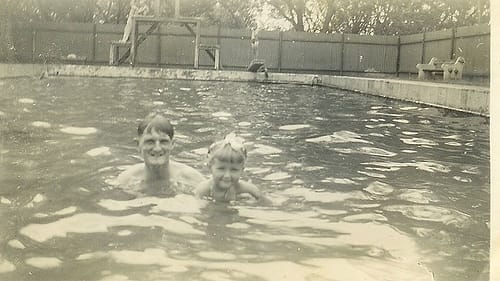Change

Globe and Phoenix Mine Swimming Pool 1950 George Banfield and daughter Tess photo courtesy of Tess Harris NZ
Change
It was 1947 when Dad resolved to run for office. The issue was the preemptory rejection, by the Mayor, of Mom’s proposal to council for a municipal swimming bath for Que Que. She and the High School Headmaster had secured the funding for it from state lotteries.
Change
Historically it had been hard to persuade anyone to run for office in Que Que. Usually the Town Clerk, John MacIntosh, would have to search in desperation for candidates and end up at the Que Que Hotel bar or even the Friends Hotel, the workers pub, as a last resort and for some alcoholic solace. With a few minutes to spare he would slap an unsuspecting soul heartily on the back and declare, “I have great news for you. I hereby declare you a Que Que Municipal Councillor, elected unopposed.
But 1947 was different. The post WWII boom, coupled with the launch of the RISCOM iron and steel development project meant change. Two retiring Councillors seeking reelection were joined by four aspirants including Dad: six candidates for two seats. It was unheard of.
Mom felt that the hanging of two British soldiers by the Irgun in Palestine would engender anti-Semitism which she felt was latent in most British folk. But Dad hoped he had established a record and rapport with the community.
There was canvassing, posters and even betting at the local bookie. The favored candidate was Al Davies, the town’s only pharmacist, a friendly intelligent Welshman whose only blemish, Dad noticed, was an uncontrollable left periorbital spastic tic, markedly exacerbated when emotionally upset. It probably explained why he always fought shy of controversy, which contributed to his popularity. He was President of the local branch of the Sons of England Society and high up in its national hierarchy.
Stuart Robertson, the sole town bookkeeper and auditor, a staunch disciple of the mayor, Harry Watt, sought to retain his seat. With Harry’s Caledonian blessing and active support his rating was a close second. Dad saw no threat in the remaining candidates. The challenge was to beat Robertson. Dad wasn’t odds on for either of the vacancies but his practice brought him in touch with most of the electorate. Though the contact was medical, conversation invariably veered to the election issue, at least when bidding farewell. He knew who gave him the nod.
Al Davies, as predicted, came in first with 70 votes. Dad was a close second with 67. Stuart Robertson had a mere 43. The minuscule tally did not indicate electorate apathy. The turnout was 97% with each voter having two votes. One voter was too ill and a couple were away in Bulawayo on business. (The Globe and Phoenix Mine was outside the village jurisdiction.)
The Town Clerk opened the Town House portals to make the official declaration. No one was in sight. Perhaps few expected the result so soon. In consternation he turned to the Mayor who headed the candidates trooping out. “Read it oot mon, read it oot. The Municipal Act says soo,” ordered Harry. Embarrassed, John Henry McIntosh dutifully as usual, obeyed.
As he ended a voice rang out, “What was all that? Repeat please.” Silver haired old Doc Richards, the Municipal Medical Officer of Health in addition to his Government appointment, emerged into the light, puffing his pipe as usual.
John Henry was non-plussed once more. He was sure the Municipal Act had no such provision. “Ach mon, Mac, geet on with it,” ordered Harry. By the end of the second reading, a motley half dozen or so arrived to repeat the Doc’s demand. John Henry, beside himself, shouted the announcement to wild cheering and banter. Only Harry and Stuart had long faces and only Stuart mumbled congratulations.
Harry sensed his cozy rubberstamp council was to be unsettled. But neither of them had any inkling of the major confrontation to come that would hit the national headlines and change the course of the town’s development and both their lives.
Special thanks to Tess Harris (nee Banfield) for sharing this photo and many other materials with me.
